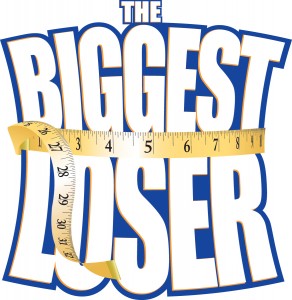business lessons from the biggest loser
The TV show The Biggest Loser 
Last year I did a short Twitter series on the business lessons I learned from the show – here’s a more complete list of the 9 things I’ve learned about business from The Biggest Loser:
1: keep metrics simple – the show uses only one measure (pounds lost) to evaluate the contestants’ progress. Clearly they are improving their health and their lives in so many other important ways, but the one number makes tracking easy. Likewise, in business we should use metrics that are easy, clear, and memorable.
2: success requires both mental and physical strength – the most successful contestants are those who are mentally tough enough to withstand the politics and emotions of the show, as well as physically strong enough to compete in the challenges. In business, I think mental strength is strategy and physical strength is execution; we need both.
3: don’t get distracted from the goal – some contestants make the mistake of emphasizing winning a particular challenge just because they want to beat the others, when they should instead be focused on the end result which is weight loss. It’s just as easy for us businesspeople to get distracted by small issues or fads or personal agendas.
4: the tortoise always beats the hare — time and again, taking a steady and sure approach in the challenges wins over starting strong and then flaming out. In business, consistency and the wise use of all of our resources ensures we cross the finish line too.
5: excel at what you can control – when competing, it’s tempting to fixate on what the competition is or isn’t doing. Problem is, we can’t control what others do. Our competitive strategy should be grounded in focusing on our own excellence and playing to our strengths first.
6: be prepared – like most shows, The Biggest Loser surprises the contestants with challenges at random times. Likewise, we never know when our businesses will be tested by customers, competitors, or even market conditions. We should always have our game on and never think that something we do won’t get noticed or won’t matter.
7: up your game – just as our bodies get used to exercising over time and so they need increasingly harder workouts, business needs innovation and continuous improvement. How many companies have lost important ground while they were resting on the laurels of their last successful new product?
8: ask for help – the contestants who sought out extra support from the trainers and their friends seemed to have more success. Likewise, collaboration and partnerships are important to businesses now more than ever. Companies that try to go at it alone miss out on the resources, ideas, and support that business partners, customers, and even competitors can provide.
9: test your limits — we won’t know what’s possible until we do. Some contestants pushed themselves beyond what they perceived their limits to be and were able to do things they never thought they could. Businesses should also challenge the past. Calculated risk taking is the key to growth.
Thanks for listening and enjoy the show!